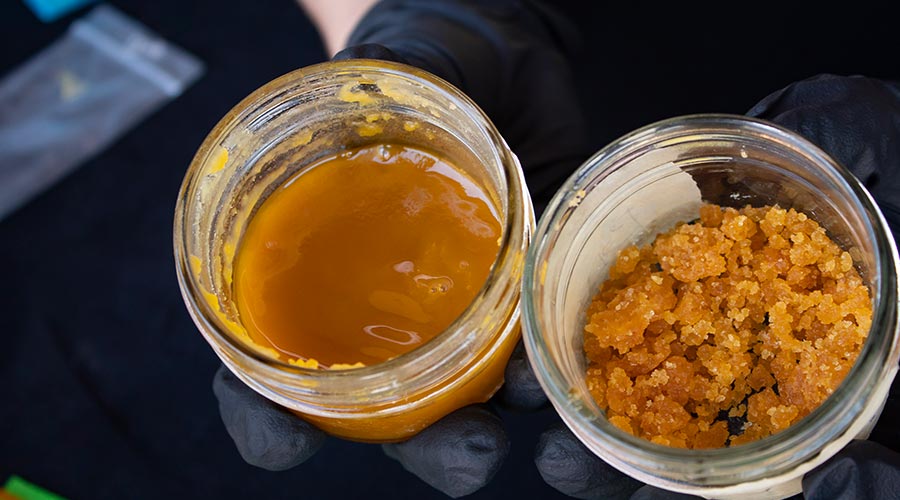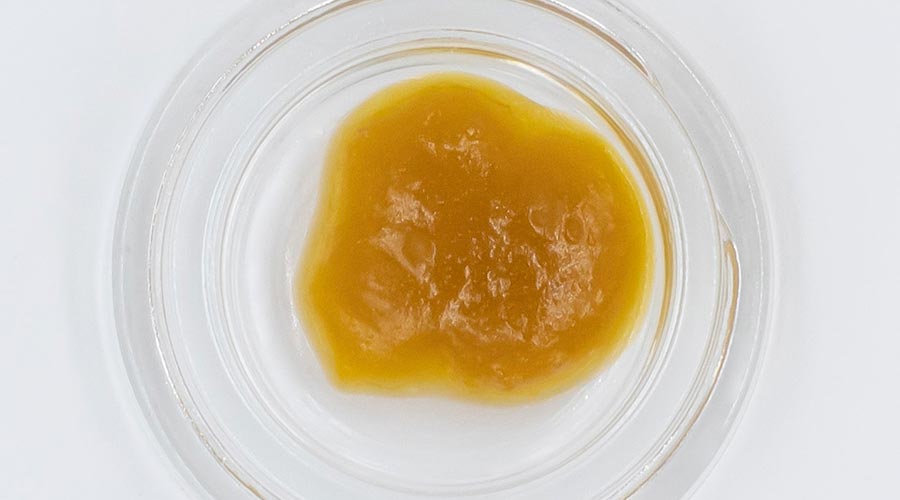When we talk about marijuana legalization, much of the focus is on the legality of cannabis flower.
Increasingly though, cannabis consumers, both medical and recreational, are turning to concentrated forms of marijuana like wax and shatter.
These products are, in essence, marijuana broken down to its simplest psychoactive form.
THC is either extracted or excess plant material is removed resulting in a cannabis concentrate with anywhere between 50 to 90 percent THC levels. Cannabis flower, on the other hand, usually contains around 10 to 35 percent THC.

While some states don’t make a legal distinction between cannabis concentrates and flower, many do.
Some states allow medical marijuana patients to use cannabis concentrates, others don’t. Some prohibitionist and semi-prohibitionist states penalize cannabis concentrate possession more severely than marijuana flower possession.
Some legal recreational marijuana states have stiff penalties in place for exceeding cannabis concentrate possession limits, while others are fairly permissive.
And some states, of course, do not allow cannabis concentrate possession whatsoever, with severe penalties in place for those who do not follow the law. Furthermore, two states – Idaho and Nebraska – prohibit even the use of non-intoxicating CBD oil, a hemp-derived concentrate containing less than 0.3 percent THC.
In this guide, we’ll present the varying cannabis concentrate laws in the US state-by-state, taking these nuances into account.
- States that prohibit cannabis concentrates for any purpose.
- States that allow cannabis concentrates for medical marijuana patients only.
- Prohibitionist and semi-prohibitionist states that penalize cannabis concentrate possession more severely than marijuana flower possession.
- States that have legalized recreational marijuana and outline their cannabis concentrate possession limits, as well as the penalties for exceeding those limits.

States that prohibit cannabis concentrates for any purpose
- Alabama
- Idaho
- Kansas
- Nebraska
- North Carolina
- South Carolina
- South Dakota
- Tennessee
- Wyoming
Medical marijuana states that permit cannabis concentrates
- Arkansas
- Delaware
- Florida
- Louisiana
- Maryland
- Minnesota
- Missouri
- New Hampshire
- North Dakota
- Ohio
- Oklahoma
- Pennsylvania
- Rhode Island
- Utah
- West Virginia
Illegal states with harsher cannabis concentrate penalties
- Georgia
- Hawaii
- Indiana
- Iowa
- Mississippi
- Nebraska
- North Carolina
- North Dakota
- Ohio
- Texas
- Wyoming
Cannabis concentrate possession limits in states with legal recreational marijuana
Alaska
Adults 21 and older can legally possess up to 7 grams of concentrates.
Possession of amounts greater than 7 grams is considered a misdemeanor, with the possibility of up to one year in jail and a $10,000 fine.
However, delivery, manufacture or possession with the intent to distribute are felony offenses punishable by one to three years in prison and a maximum fine of $100,000.
Arizona
Adults 21 and older can legally possess up to 5 grams of concentrates.
Amounts between 5 and 12 grams are considered a petty offense with a maximum fine of $300.
Cannabis concentrate possession in excess of 12.5 grams, however, is a felony offense punishable by 1 to 3.75 years in prison and a maximum fine of $150,000.
Manufacturing, trafficking or illicitly selling any amount of concentrate is also a felony offense punishable by 3 to 12.5 years in prison and a maximum fine of $150,000.
California
Adults 21 and older can legally possess up to eight grams of concentrates, but possessing amounts greater than this is considered a misdemeanor punishable by up to six months in jail and a $500 fine.
Illicit manufacturing of concentrates can result in a prison sentence of 16 months to three years, as well as a fine of $500. This increases to a sentence of three to seven years and a fine of $50,000 if the manufacturing process involves the use of extraction chemicals, like butane.
Colorado
Adults 21 and older can legally possess up to two ounces of concentrates.
Possession of between two to three ounces of concentrates is a misdemeanor punishable by six to 18 months in prison and a maximum $5,000 fine.
Possession of more than three ounces of concentrates is a felony offense punishable by six months to two years in prison and a maximum $100,000 fine.
Unlike with marijuana flower, gifting up to two ounces of concentrates is a misdemeanor punishable by six to 18 months in prison and a $5,000 fine. Distributing, transferring, or possessing with intent amounts greater than this are felony offenses that come with long prison sentences and hefty fines.
Connecticut
Adults 21 and older can legally possess up to 1.5 ounces of concentrate in public, and up to five ounces in private residences.
The penalties for exceeding these amounts are the same as for marijuana flower, and can be viewed here.
District of Columbia
While Washington, D.C. legalized marijuana flower possession, concentrates are still technically considered a controlled substance.
Possession of any amount is punishable by up to 180 days in jail and a $100 fine.
Manufacturing concentrates comes with up to five years in prison and a maximum $50,000 fine.
Illinois
Adults 21 and older can legally possess up to five grams of concentrates. For out-of-state visitors, the cannabis concentrate possession limit is 2.5 grams.
Penalties for exceeding these limits are the same for concentrates as they are for marijuana flower, and can be viewed here.
Maine
Adults 21 and older can legally possess up to five grams of concentrates.
Possession of more than five grams is considered a criminal offense, punishable by up to one year in jail and a maximum fine of $2,000.
Illicit sales or distribution of any amount of concentrate is also a criminal offense, punishable by up to five years in prison and a maximum fine of $5,000.
Massachusetts
Adults 21 and older can legally possess up to five grams of concentrates.
Possession of between five grams and one ounce is a civil offense subject to a $100 fine.
Possession of more than one ounce of concentrates, however, is punishable by up to one year in jail and a maximum fine of $100.
Illicitly manufacturing or distributing concentrates is punishable by 2.5 to five years in prison and a maximum fine of $5,000.
Michigan
Adults 21 and older can legally possess and gift up to 15 grams of concentrates.
The penalties for exceeding this amount are the same as for marijuana flower, and can be viewed here.
Montana
Adults 21 and older can legally possess up to eight grams of concentrates.
Exceeding this limit comes with potentially stiff penalties though. Possession of more than eight grams of concentrates is a felony offense, punishable by up to five years in prison and a maximum fine of $1,000.
Nevada
Adults 21 and older can legally possess and gift up to 3.5 grams of concentrates, but only in private residences.
Possession of up to 3.5 grams of concentrates in public is a misdemeanor, subject to a $600 fine.
Possession of between 3.5 grams and one pound of concentrates is a felony offense, punishable by up to four years in prison and a maximum fine of $5,000.
New Jersey
Adults 21 and older can legally possess up to 17 grams of concentrates.
Possession of more than 17 grams is a criminal offense, punishable by up to 18 months in prison and a maximum fine of $25,000.
Manufacturing, distributing or possessing with intent to sell fewer than five grams of concentrates is waived on first offense, but a subsequent offense is considered criminal and subject to 18 months in prison and a maximum fine of $25,000.
Amounts greater than five grams come with longer prison sentences and heftier fines from the first offense.
New Mexico
Adults 21 and older can legally possess up to 16 grams of concentrates in public, with no set possession limits at private residences.
Possession of more than 16 grams is a misdemeanor, punishable by up to one year in jail and a maximum fine of $1,000.
Distributing or possessing with intent is a felony offense carrying the possibility of three years in prison and a maximum fine of $5,000.
New York
Adults 21 and older can legally possess up to 24 grams of concentrates.
Possession of between 24 grams and one ounce is a felony offense, punishable by up to seven years in prison and a maximum fine of $5,000.
This increases to 15 years in prison and a $15,000 fine for possession of more than one ounce of concentrates, while illicit sales of any amount are subject to these penalties as well.
Oregon
Adults 21 and older can legally possess up to 16 ounces of solid-infused cannabis, 72 ounces of liquid-infused cannabis, and one ounce of marijuana extract.
However, possession of more than 0.25 ounces of concentrate that wasn’t purchased from a state-licensed retailer is a felony offense punishable by up to five years in prison and a maximum fine of $125,000.
Vermont
Adults 21 and older can legally possess up to five grams of concentrates.
Possession of more than five grams is a misdemeanor, punishable by up to six months in jail and a maximum $500 fine for first time offenses. Subsequent offenses are punishable by up to two years in prison and a maximum fine of $2,000.
Virginia
Adults 21 and older can legally possess up to one ounce of concentrates, the same as for marijuana flower.
Possession of between one ounce and one pound of concentrates is a civil violation subject to a $25 fine.

